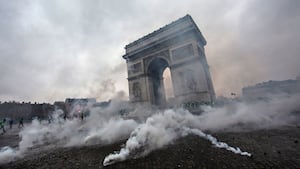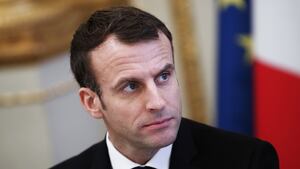PARIS—French President Emmanuel Macron’s Yellow Vest protest drama has rumbled through nine acts, a boffo tragicomedy set to have a longer and more culturally significant run than Hamilton and perhaps Tartuffe.
Benjamin-Blaise Griveaux, who plays the role of Macron’s spokesperson, described the nine-week old production as an attempted “coup d’état.” He was in large part referring to the thousands of cast members who’ve so far destroyed 1,920 of the Fifth Republic’s 3,200 highway speed cameras at a cost of some $176 million.
The government’s narrative is, speed kills. The leaderless Yellow Vests say the country’s taxes are murder. Macron hopes his unprecedented three-month national debate on the future will discover the culprit. He’s asked the country 20 questions on topics like austerity, the role of the state, climate change and democratic values.
But money—and the lack thereof—is the only leitmotif of this coroner's inquest. The Yellow Vests say the economic charts-and-graphs Macron uses to set fiscal policy provide useless data designed to obfuscate the only number that matters: France’s $2.8 trillion-and-growing national debt, along with the some $62 billion a year in interest payments.
The Yellow Vests want Macron to demand France’s creditors erase that debt and use the cash to fund education, housing, and jobs. They also want the country to exit NATO, skedaddle the European Union and re-nationalize all French industry.
As Macron tells it, the Yellow Vests are hollering down a well.
“Too many of our citizens think they can get what they want without hard work,” Macron imperially lectured the nation last week. No need to recount what else he’s said since the curtain went up on the Yellow Vest theatrical. Why bother? That one line says it all.
Macron gambled that his November decision to increase wages and spike the rise in the national fuel tax that triggered the protests would bring down the curtain. The Yellow Vests in January responded by ramming a ministry door with a forklift, leaving Macron so politically buck-toothed that he could eat a soggy sack of globalized UberEats croissants through one of the picket fences he threw up around the Elysée Palace.
Indeed, Macron’s boxcar load of belligerent responses to the disenfranchised is nothing new in France. Back in the 15th century, gangs of coquillards, the economic and social casualties of the Hundred Years War, terrified the crown. The government commonly described them as “dispossessed, deserters, destitute or those who simply refuse to work.” And, when they eventually did find work, Finance Minister Jean-Baptiste Colbert advised his sovereign King Louis XIV that “the art of taxation consists in so plucking the goose as to obtain the largest amount of feathers with the least possible amount of hissing.”
Every French citizen knows Marie-Antoinette told her subjects to eat carbohydrates. Napoleon III completely ignored what French historian Andrew Hussey described as “the reality of misery and poverty that lay beneath the surface of his spectacular but hollow empire.” Now, the Yellow Vests say, Macron is genuinely and personally offended at finding himself running a country where a seven-course meal has devolved into a six-pack of KFC fingers and a glass of cider.
The days after Macron assumed the French presidency on May 14, 2017, were rich in foie gras and grand cru. Revellers celebrated the then 39-year-old student actor-turned-investment banker-turned politician as the French reincarnation of U.S. President John F. Kennedy. But many Yellow Vests say Macron, unlike JFK, has proven himself to be bereft of the noblesse oblige that should come with privilege. Which explains probably better than anything else why it’s impossible for him to come to grips with his peasant uprising that’s so far left 10 dead and wounded some 2,600 people, according to the Ministry of the Interior.
Meanwhile, over at the French National Assembly, the aptly named maison sans fenêtres (house without windows), not a creature is stirring, not even an opposition. Macron’s La République en Marche! (Republic on the Move) party controls more than 300 of parliament’s 577 seats. The once omnipotent French Socialist Party in 2017 had to sell its headquarters for $53.8 million and the political heirs of the conservative coteries managed by Jacques Chirac and Nicolas Sarkozy are rumored to have migrated to Palm Beach. Communist Jean-Luc Mélenchon, leader of the France Unbowed party, is all gurgle, and members of Marine Le Pen’s National Rally, a.k.a. National Front, are politely referred to as fascists.
French politics for centuries has accommodated all the ingredients of an opéra bouffe without a happy ending. Macron wants to use his three-month discussion on the fate of the nation to write a new script. So there’s certainly a lot to talk about as the country inches toward the potential creation of a Sixth Republic. Macron describes his great debate with 67 million French people as a “consultation.” Be assured the examination will be as lurid and painful as consulting with a proctologist.









